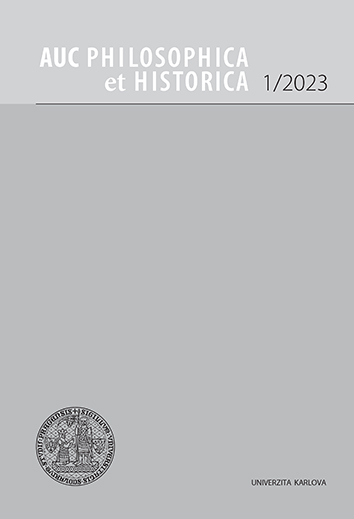AUC Philosophica et Historica je víceoborový akademický časopis zaměřený na humanitní a společenskovědné obory (filozofie, psychologie, pedagogika, sociologie, obecné, české a hospodářské dějiny, pomocné vědy historické a archivnictví, etnologie).
Časopis je indexován v databázích CEEOL, DOAJ a EBSCO.
AUC PHILOSOPHICA ET HISTORICA, Vol 1992 No 2 (1992), 41–64
Ke kořenům sporu o metodu empirické sociologie
[To the Roots of the Controversy Concerning the Method of Empiric Sociology]
Jiří Buriánek
DOI: https://doi.org/10.14712/24647055.2018.105
zveřejněno: 15. 01. 2018
Abstract
Ongoing controversies concerning the method in empiric sociology, which, however, cannot be reduced to a somewhat artificially kept-up contradiction of qualitative and quantitative methods, closely permeate the solution of the problem of operationalization. In it two specifically sociological methodological approaches are confronted: more attention has traditionally been given to the neo-posivist line. The article is not, however, concerned with its origins (P. W. Bridgman and G. A. Lundberg), it concentrates on the "classic" conception of P. F. Lazarsleld. We call attention to the elements of an explorative formation of a primary idea of the concept and to the effort to reach a systematic conception of operationalization. Attention is also devoted to the conception of typological operations in the space of variables. Further, we follow the development of neo-positivism toward more liberal positions, in particular the concept of dimensional analysis in H. Zetterbeg, the conception of auxilliary theory in H. Blalockor D. Campbell’s idea of multiple operationalizanon. The anti-operationalist tendency originates in H. Blumer’s radical opinions. He offered a radically different solution based on concepts of exploration and inspection. Here, too, can certain differences be observed and later also a tendency toward moderation of opinions: within interactionist methodology these are represented especially by N. K. Denzin. The conception of triangulation in the sense of a multiple analysis of the subject appears as a widely acceptable solution. Further it is necessary’ also to note considerations reminding of the significance of an adequate choice of object or sample (especially in connection with the study of groups, social nets etc.). Sharp criticism of the "constructive" methodology of neopositivism comes also from the camp of ethnomethodology (A. Cicourel). Phenomenology-inspired sociology is then joined by schools based on hermeneutics. Within these, too, there are debates (J. Habermas, U. Oeverman) – the stress on exploration or on interpretation and pre-interpretation clashes with the necessity to perceive certain laws of social reality and to keep sociology an objective science, although its subject is the perception of the meaning of human behaviour. Synthetizing approaches are represented mo in detail by T. Luckmann; the singular although somewhat eclectical methodological approach of A. Giddens is also discussed. Conclusions offered do not tend to the contradictoriness of quantitative and qualitative methods. Neither are there presupposed simple solutions in that a simplified conception of social reality as a mere outside object would be substituted by a hypertrofization of the subject-subject relation and a "new" constructivism of a sort. It is necessary to pursue an equilibrium of approaches, botl explorative and confirmative. A dynamically understood operationalization conjoined with interpretation remains an important principle of scientific analysis. It does not, of course, present a simple algoritm: it seems rather to be a lasting impulse to deeper reflection both methodological and. after all, theoretical.
